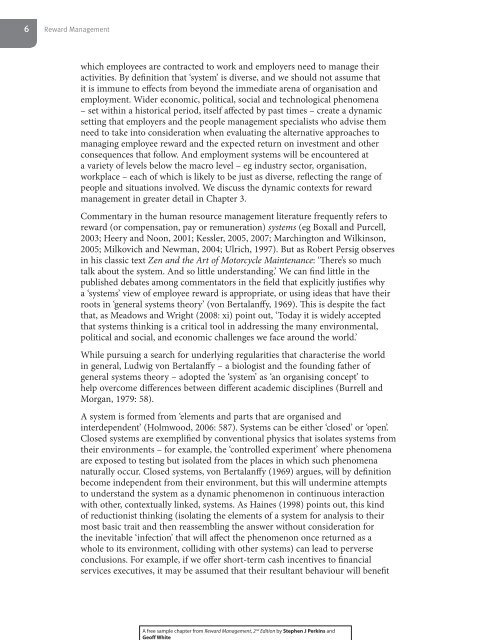Introducing the Reward Management System - CIPD
Introducing the Reward Management System - CIPD
Introducing the Reward Management System - CIPD
Create successful ePaper yourself
Turn your PDF publications into a flip-book with our unique Google optimized e-Paper software.
6<br />
<strong>Reward</strong> <strong>Management</strong><br />
which employees are contracted to work and employers need to manage <strong>the</strong>ir<br />
activities. By definition that ‘system’ is diverse, and we should not assume that<br />
it is immune to effects from beyond <strong>the</strong> immediate arena of organisation and<br />
employment. Wider economic, political, social and technological phenomena<br />
– set within a historical period, itself affected by past times – create a dynamic<br />
setting that employers and <strong>the</strong> people management specialists who advise <strong>the</strong>m<br />
need to take into consideration when evaluating <strong>the</strong> alternative approaches to<br />
managing employee reward and <strong>the</strong> expected return on investment and o<strong>the</strong>r<br />
consequences that follow. And employment systems will be encountered at<br />
a variety of levels below <strong>the</strong> macro level – eg industry sector, organisation,<br />
workplace – each of which is likely to be just as diverse, reflecting <strong>the</strong> range of<br />
people and situations involved. We discuss <strong>the</strong> dynamic contexts for reward<br />
management in greater detail in Chapter 3.<br />
Commentary in <strong>the</strong> human resource management literature frequently refers to<br />
reward (or compensation, pay or remuneration) systems (eg Boxall and Purcell,<br />
2003; Heery and Noon, 2001; Kessler, 2005, 2007; Marchington and Wilkinson,<br />
2005; Milkovich and Newman, 2004; Ulrich, 1997). But as Robert Persig observes<br />
in his classic text Zen and <strong>the</strong> Art of Motorcycle Maintenance: ‘There’s so much<br />
talk about <strong>the</strong> system. And so little understanding.’ We can find little in <strong>the</strong><br />
published debates among commentators in <strong>the</strong> field that explicitly justifies why<br />
a ‘systems’ view of employee reward is appropriate, or using ideas that have <strong>the</strong>ir<br />
roots in ‘general systems <strong>the</strong>ory’ (von Bertalanffy, 1969). This is despite <strong>the</strong> fact<br />
that, as Meadows and Wright (2008: xi) point out, ‘Today it is widely accepted<br />
that systems thinking is a critical tool in addressing <strong>the</strong> many environmental,<br />
political and social, and economic challenges we face around <strong>the</strong> world.’<br />
While pursuing a search for underlying regularities that characterise <strong>the</strong> world<br />
in general, Ludwig von Bertalanffy – a biologist and <strong>the</strong> founding fa<strong>the</strong>r of<br />
general systems <strong>the</strong>ory – adopted <strong>the</strong> ‘system’ as ‘an organising concept’ to<br />
help overcome differences between different academic disciplines (Burrell and<br />
Morgan, 1979: 58).<br />
A system is formed from ‘elements and parts that are organised and<br />
interdependent’ (Holmwood, 2006: 587). <strong>System</strong>s can be ei<strong>the</strong>r ‘closed’ or ‘open’.<br />
Closed systems are exemplified by conventional physics that isolates systems from<br />
<strong>the</strong>ir environments – for example, <strong>the</strong> ‘controlled experiment’ where phenomena<br />
are exposed to testing but isolated from <strong>the</strong> places in which such phenomena<br />
naturally occur. Closed systems, von Bertalanffy (1969) argues, will by definition<br />
become independent from <strong>the</strong>ir environment, but this will undermine attempts<br />
to understand <strong>the</strong> system as a dynamic phenomenon in continuous interaction<br />
with o<strong>the</strong>r, contextually linked, systems. As Haines (1998) points out, this kind<br />
of reductionist thinking (isolating <strong>the</strong> elements of a system for analysis to <strong>the</strong>ir<br />
most basic trait and <strong>the</strong>n reassembling <strong>the</strong> answer without consideration for<br />
<strong>the</strong> inevitable ‘infection’ that will affect <strong>the</strong> phenomenon once returned as a<br />
whole to its environment, colliding with o<strong>the</strong>r systems) can lead to perverse<br />
conclusions. For example, if we offer short-term cash incentives to financial<br />
services executives, it may be assumed that <strong>the</strong>ir resultant behaviour will benefit<br />
A free sample chapter from <strong>Reward</strong> <strong>Management</strong>, 2 nd Edition by Stephen J Perkins and<br />
Geoff White<br />
Published by <strong>the</strong> <strong>CIPD</strong>.<br />
Copyright © <strong>CIPD</strong> 2011<br />
All rights reserved; no part of this excerpt may be reproduced, stored in a retrieval system,<br />
or transmitted in any form or by any means, electronic, mechanical, photocopying, recording,<br />
or o<strong>the</strong>rwise without <strong>the</strong> prior written permission of <strong>the</strong> Publishers or a licence permitting<br />
restricted copying in <strong>the</strong> United Kingdom issued by <strong>the</strong> Copyright Licensing Agency.<br />
If you would like to purchase this book please visit www.cipd.co.uk/bookstore.

















